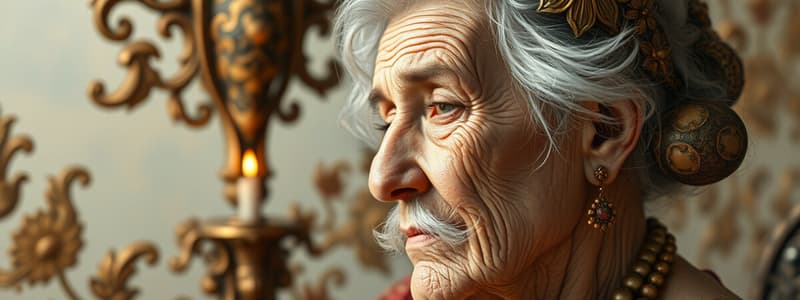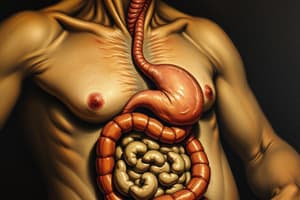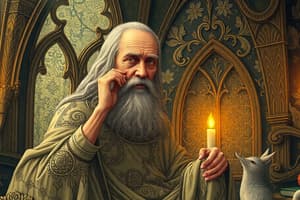Podcast
Questions and Answers
What do individuals make rational choices about?
What do individuals make rational choices about?
The relative worth of what they can gain in contrast to what they must give up.
In contemporary society, older individuals have equal bargaining power in social exchanges as younger individuals.
In contemporary society, older individuals have equal bargaining power in social exchanges as younger individuals.
False (B)
According to the subculture of aging, what may offset the negative attributes of aging?
According to the subculture of aging, what may offset the negative attributes of aging?
- Social status
- Increased independence
- Financial wealth
- Group identification and consciousness (correct)
What is age stratification theory concerned with?
What is age stratification theory concerned with?
What is a major concern of the life course theoretical perspective?
What is a major concern of the life course theoretical perspective?
The subculture of aging implies that older people tend to identify with each other's common ______.
The subculture of aging implies that older people tend to identify with each other's common ______.
What is the definition of the 'political economy of aging'?
What is the definition of the 'political economy of aging'?
The concept of deficiency citations is related to facilities that violate Medicare/Medicaid regulations.
The concept of deficiency citations is related to facilities that violate Medicare/Medicaid regulations.
What is the third age?
What is the third age?
What is a theory?
What is a theory?
What is a gerontocracy?
What is a gerontocracy?
What marked the Victorian age in terms of views on aging?
What marked the Victorian age in terms of views on aging?
What does activity theory propose about aging?
What does activity theory propose about aging?
Who is Robert Havighurst?
Who is Robert Havighurst?
What is continuity theory?
What is continuity theory?
What is selective optimization with compensation?
What is selective optimization with compensation?
What is the definition of successful aging according to Rowe and Kahn?
What is the definition of successful aging according to Rowe and Kahn?
What does disengagement theory focus on?
What does disengagement theory focus on?
What does modernization theory assert regarding older people's status?
What does modernization theory assert regarding older people's status?
What is exchange theory?
What is exchange theory?
Flashcards
Gerontocracy
Gerontocracy
A society where elders control resources and knowledge.
Victorian Age Perspectives on Aging
Victorian Age Perspectives on Aging
Divided old age into 'good' (positive traits) and 'bad' (negative traits).
Activity Theory
Activity Theory
Maintaining activities leads to better aging outcomes.
Robert Havighurst's View on Aging
Robert Havighurst's View on Aging
Signup and view all the flashcards
Continuity Theory
Continuity Theory
Signup and view all the flashcards
Selective Optimization with Compensation
Selective Optimization with Compensation
Signup and view all the flashcards
Successful Aging Definition
Successful Aging Definition
Signup and view all the flashcards
Disengagement Theory
Disengagement Theory
Signup and view all the flashcards
Modernization Theory
Modernization Theory
Signup and view all the flashcards
Exchange Theory
Exchange Theory
Signup and view all the flashcards
Subculture of Aging
Subculture of Aging
Signup and view all the flashcards
Age Stratification Theory
Age Stratification Theory
Signup and view all the flashcards
Life Course Theoretical Perspective
Life Course Theoretical Perspective
Signup and view all the flashcards
Critique of Age-as-Leveler
Critique of Age-as-Leveler
Signup and view all the flashcards
Critical Theory of Aging
Critical Theory of Aging
Signup and view all the flashcards
Political Economy of Aging
Political Economy of Aging
Signup and view all the flashcards
The Third Age Concept
The Third Age Concept
Signup and view all the flashcards
Birth Cohorts and Aging
Birth Cohorts and Aging
Signup and view all the flashcards
Double Jeopardy
Double Jeopardy
Signup and view all the flashcards
Deficiency Citations in Nursing Homes
Deficiency Citations in Nursing Homes
Signup and view all the flashcards
Study Notes
Theories of Aging Overview
- Theories help explain, describe, and predict behaviors related to aging.
- Aging research must consider both individual and societal factors due to their interconnected nature.
Gerontocracy
- Refers to a society where elders have control over resources and knowledge.
- Historical views on gerontocracy vary, indicating elders often relied on resource control for status.
Victorian Age Perspectives
- Divided old age into "good old age" (positive traits) and "bad old age" (negative traits).
- Negative perceptions of aging grew during the late 19th and early 20th centuries, linking aging to poverty and decline.
Activity Theory
- Advocates that maintaining activities leads to better aging outcomes.
- Derived from the Kansas City Studies, it correlates social satisfaction and activity levels among older adults.
Robert Havighurst's Contributions
- Successful aging is linked to sustaining middle-aged activities and attitudes.
- Emphasizes the importance of life engagement for well-being.
Informal Social Activities
- Studies show that informal interactions with friends significantly enhance life satisfaction among older adults.
Continuity Theory
- Suggests personality remains stable despite aging, with individuals using established coping mechanisms.
- Highlights the importance of personal traits and habits in adapting to life changes.
Selective Optimization with Compensation
- A newer theory suggesting older adults balance gains and losses by optimizing strengths.
- Focuses on adaptive strategies rather than merely maintaining middle-aged behaviors.
Successful Aging Definition
- Defined as maintaining good health, high functioning, and active engagement with life.
- Framework outlined by Rowe and Kahn emphasizes key behaviors for aging well.
Critique of Productive Aging
- Criticized for vague definitions of "productiveness" and the potential stigma attached to those with impairments.
- Recognizes the importance of individual coping strategies.
Disengagement Theory
- Suggests a natural withdrawal from social roles as individuals age, which is essential for societal stability.
- Not synonymous with inactivity; highlights different quality and types of social engagement.
Critiques of Disengagement Theory
- Misunderstandings of disengagement as apathy; emphasizes meaningful personal roles instead.
- The theory is important for advancing social science understandings of aging and gender differences.
Modernization Theory
- Describes how industrialization reduces elder influence and prestige.
- Assumes older adults face diminished roles as society transitions to technology-based structures.
Exchange Theory
- Focuses on the social and economic exchanges between older and younger individuals.
- Older adults often hold less bargaining power due to their reduced economic contributions in retirement.
Subculture of Aging
- Older adults create a subculture for support and identity following social disengagement.
- This solidarity may lead to unified action despite negative societal perceptions.### Subculture of Aging
- Older adults form a subculture, identifying with shared interests and exerting political power to influence policies and attitudes toward their demographic.
Age Stratification Theory
- Proposes a framework considering both age and social class within societal stratification.
- Middle-aged and older adults typically have greater resources (income, political power, media access) shaped by their institutional roles.
- Experiences differ by historical cohorts, influencing opportunities, challenges, and life stages—emphasizes caution in generalizing "normal aging."
Birth Cohorts and Aging
- Distinct cohorts (e.g., Baby Boomers vs. Great Depression survivors) shape varied aging experiences, attitudes, and behaviors.
- Different generations exhibit diverse cultural preferences; music tastes serve as a primary example of how age impacts identity.
Life Course Theoretical Perspective
- Focuses on life patterns from birth to death, influenced by historical context and cohort membership.
- Defines aging as a lifelong process impacted by social changes and historical events.
- Shared experiences within a cohort (e.g., growing up during the Great Depression) lead to similar life challenges and opportunities.
Vietnam Veterans' Experiences
- Young males during the Vietnam War faced mandates to serve or find exemptions, influencing their future experiences.
- Upon return, Vietnam veterans lacked recognition and benefits compared to veterans of previous wars.
Age-as-Leveler Critique
- Critiques the assumption that aging homogenizes individuals, ignoring the roles of race, ethnicity, social class, and gender.
- Introduces the concept of double jeopardy, showing older minority group members face compounded adversities related to age and social hierarchy.
Critical Theory
- Examines power dynamics and inequalities intersecting with age, particularly focusing on gender roles.
- Demonstrates that older women experience greater financial insecurity and lower income levels compared to men.
Political Economy of Aging
- Highlights the influence of social hierarchies on aging, illustrating the impact of economic factors on older people's social status.
- Discusses the conflict between capitalist motivations and the needs of the elderly, as profit often takes precedence over elder care.
Deficiency Citations in Nursing Homes
- Approximately 20% of nursing homes receive deficiency citations for violating Medicare/Medicaid regulations regarding abuse, neglect, and policy compliance.
The Third Age Concept
- Refers to the life stage after retirement but before significant disability, challenging ageist stereotypes.
- Frames older adults as active contributors to society rather than merely dependent individuals, promoting the idea of engagement in productive roles.
Studying That Suits You
Use AI to generate personalized quizzes and flashcards to suit your learning preferences.




